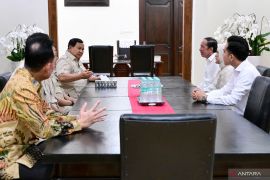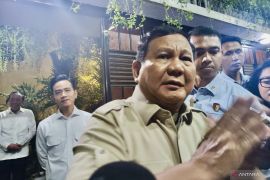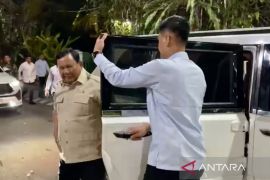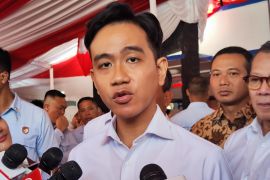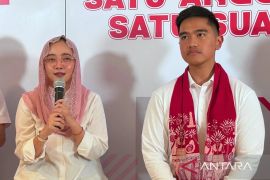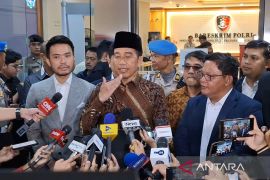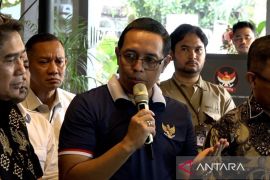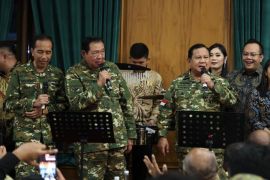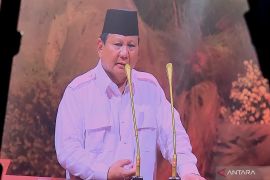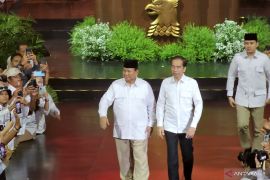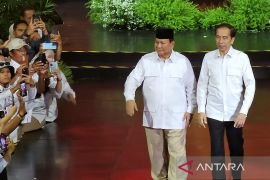After arriving in Germany on Monday (April 18), President Jokowi and Chancellor Angela Merkel met and discussed a range of issues, from economic cooperation and vocational education centers to terrorism.
On the occasion, Merkel stated that there had been economic cooperation between Germany and Indonesia, including in maritime components, health sector and also transportation.
"There is still an opportunity in the industrial field and we are going to increase initiatives in this respect," she said.
Merkel said Indonesia has expressed an interest in strengthening its trade agreement with the European Union and Germany is supporting it so that negotiations could be started soon.
President Jokowi, meanwhile, said Germany is Indonesias number one trade partner and the seventh biggest investor.
"Besides economic matters, (we also discussed) vocational education and, therefore, he (Jokowi and entourage) visited Siemens," Merkel said at a joint press conference with President Jokowi after the meeting at her office.
Jokowi further said, "Indonesia wishes for German assistance in the field of vocational education, especially in the fields of industry, electricity, textile and maritime."
The German chancellor said she had also discussed certain issues related to ASEAN, Papua and Aceh. She praised Indonesia, which, as the worlds biggest Muslim country, has successfully remained tolerant.
"Indonesia, as the biggest Muslim country, has been able to maintain a system in such a way that there has been no conflict and it has also overcome challenges posed by the threat of terrorism through social and cultural support," she said.
Jokowi said he also exchanged views on how to deal with terrorism through both, hard and soft power approaches.
In London on Tuesday (April 19), Jokowi held talks with British Prime Minister David Cameron at the latters office at 10, Downing Street.
Among those accompanying the president at the meeting were Cabinet Secretary Pramono Anung, Coordinating Minister for Economic Affairs Darmin Nasution, Maritime Affairs and Fisheries Minister Susi Pudjiastuti, Foreign Minister Retno Marsudi and Chief of the Investment Coordinating Board (BKPM) Franky Sibarani.
Meanwhile, Jokowi reiterated Indonesias firm stance against illegal fishing as it violated the countrys sovereignty and harmed the marine environment of the Indonesian waters.
"Especially with regard to maritime resources, we will continue with our firm stance not to tolerate any illegal fishing activities in our waters," Jokowi stated on Tuesday before delegates from 107 member states and 53 non-governmental organizations in his address to the IMOs Marine Environment Protection Committee.
Sustainable management of the worlds oceans will be crucial to global development, the president affirmed.
In addition, the president also outlined Indonesias national strategy for maritime development and confirmed his support for the IMO.
Comprising over 17 thousand islands, Indonesia is striving to unite the nation by building inter-island connectivity.
As part of the sea toll development program, the country has been constructing new seaports, upgrading the existing harbors, adding more cargo and passenger ships, and modernizing its seaport management, he remarked.
"All these steps are aimed at accelerating and evenly distributing Indonesias economic growth and making them more efficient and competitive," he stated.
Since last year, the government has constructed 27 new seaports, and 68 more are still under construction in North Maluku, Papua, East Nusa Tenggara, and Sulawesi, among others.
"Right now, we are adding 200 patrol, cargo, passenger and navigation boats," he remarked.
On Wednesday (April 20), Indonesia and Great Britain signed several cooperation agreements in the economic, education, sports and maritime sectors.
At least, five memoranda of understanding (MoUs) were signed between the two governments focusing on cooperation to boost the creative industry, the higher education sector, exchange of information and experiences in the management of sports events, as well as to streamline maritime and fisheries regulations.
Apart from that, the Garuda Indonesia flag carrier is also cooperating with Airbus and Rolls Royce to improve and develop the capacity and skills of human resources for the maintenance of bigger engines of Rolls Royce and the expansion of the Garuda Maintenance Facility.
The MoUs were signed by Minister of Indonesian Foreign Affairs Retno Marsudi, Minister of Maritime and Fishery Susi Pudjiastuti and Executive Director of Garuda Indonesia Arif Wibowo.
With the signing of the MoU in the sports sector, Indonesia and Britain can share experiences and information on maximizing trade, business and investment for organizing sports championship events.
It is important for Indonesia to gain an understanding of the management of sports events as Britain had hosted the 2012 Olympics, and Indonesia is preparing to host the Asian Games 2018.
In The Hague on April 22, Indonesia and the Netherlands signed a Memorandum of Understanding (MoU) in various sectors, including maritime and education, during a bilateral meeting between President Joko Widodo (Jokowi) and Prime Minister Mark Rutte on Friday.
The two countries signed the MoU at the end of the bilateral meeting. The MoU covers higher education, science and maritime cooperation.
The President expressed the hope that his visit to the Netherlands as part of his four-European nation tour will enhance relations between the two countries.
Jokowi said he was happy with the realization of infrastructure projects, particularly those related to water supply and sanitation, water for food and ecosystem, water governance and water safety.
Indonesia is facing challenges when it comes to controlling floods and coastal abrasion, and ensuring clean water supply, he said.
The president expressed the hope that cooperation in water management should focus on addressing these three issues, particularly with regard to transfer of expertise and technology.
In the maritime sector, the president lauded the Dutch government for taking interest in helping Indonesia achieve its maritime axis vision. The vision was realized by developing maritime clusters including fisheries, ship development, infrastructure and marine resources.
"I invite the Dutch companies in the maritime sector to participate in the development of deep seaports in the eastern parts of Indonesia," he said.
He further said the Netherlands is one of Indonesias main partners in the trade and investment fields. However, trade between the two countries declined to US$4.22 billion in 2015 from $4.89 billion in 2014.
Dutch investment in Indonesia also dropped to $1.31 billion in 2015 from $1.73 billion in 2014.(*)
Reporter: Bustanudin
Editor: Heru Purwanto
Copyright © ANTARA 2016
